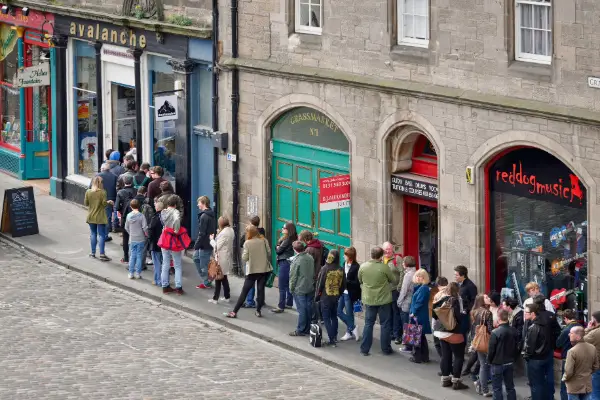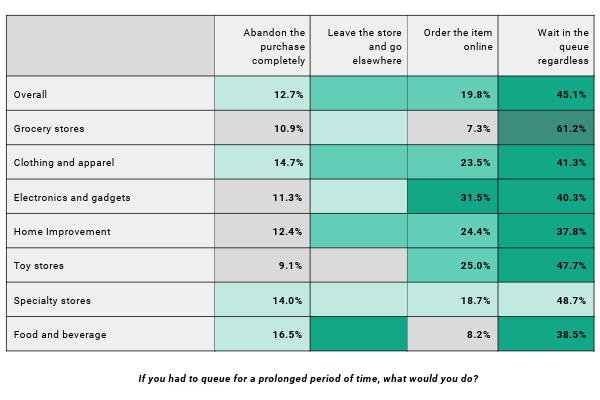How Long Lines Drive Away UK Retail Customers
A busy store often indicates strong sales, but long lines at the checkout can harm profits for retailers. The checkout process is an important step that affects how long customers spend shopping. Our recent study exposes the hidden costs of frustration during this critical moment.
The study discovered that although most customers (63%) reported short wait times, busy sectors like grocery (52.7%) and clothing (56.8%) are failing to meet customer expectations. These high-traffic environments need urgent improvement.
On average, customers lose patience after just over 5 minutes of waiting, causing them to abandon their purchases. When encountering a long queue, 35.1% of customers said they would go elsewhere to make their purchases, while 19.8% would shop online – resulting in lost revenue for physical stores.
Food and beverage customers are even more impatient, with 36.8% leaving at the first sign of a long queue. Not surprisingly, younger shoppers desire the quickest experience possible, typically aiming to complete their entire shopping trip in under 15 minutes.
The message is clear – to keep up with changing consumer behaviour, retailers must absolutely streamline the checkout process and minimise wait times. A fast, hassle-free checkout process is now essential for providing a convenient experience that keeps customers returning.
The Differences in Customer Behaviour
The study suggests that while retailers are under pressure to speed up their processes, there are differences in expectations across various industries and age groups.
For instance, shoppers buying groceries, which often involve bulky items, tend to be more patient compared to those purchasing clothes, as clothes are considered less urgent purchases.
Millennials and Gen Z, who are accustomed to instant access to everything, have very high expectations due to their seamless digital experiences. These shoppers are not willing to tolerate slow in-store procedures.
How to Improve the Checkout Experience in Retail Stores
Improving the checkout experience requires a comprehensive approach that combines new technologies with operational optimisations.
On the technological front, advanced queue management systems can analyse real-time traffic flows, enabling easy staff reallocation to achieve optimal throughput. Mobile checkout solutions also provide a way to avoid queues altogether.
Operationally, training staff to perform multiple roles such as cashiering and restocking can provide the flexibility needed to meet demand. Analysing transaction data and customer feedback is also necessary for identifying specific issues to address.
However, the most important aspect is for retailers to shift their organisational mindset to become truly customer-focused. In today’s retail environment, where seamless purchasing experiences are the norm, efficiently getting customers in and out with their purchases is essential.
Retailers that address the checkout experience comprehensively – by combining the right technologies, processes, and culture – will benefit from increased customer loyalty.
For more strategies, you can download our full report “Report: The Resilience of High-Street Retail – Systopia”.












